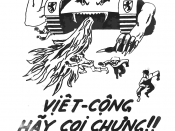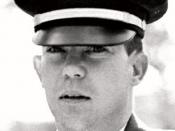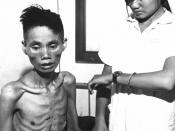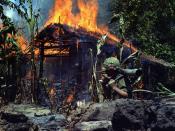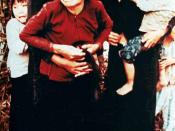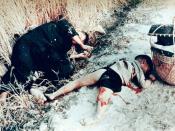The massacre at My Lai is one of the many results of the negative psychological effects on the men that fought in the Vietnam War. Tim Oâ≢Brienâ≢s interpretation of Vietnam in The Things They Carried paints a vivid picture about the horrors of war, how someone could snap, and how easy it is for someone to lose their principles. My Lai is representative of the extreme situations that occurred in war. On March 16, 1968, Charlie Company was ordered into the small hamlet of My Lai located outside of the Son My village in Vietnam. They were told that they would find Viet Cong soldiers, but instead they only found civilians. Despite the lack of resistance, Charlie Company opened fire. In a matter of 4 hours, 500 civilians including women and children were killed in cold blood. Immediately after the scandal came the extensive cover-up. Reports on the My Lai operation stated, â∠Âââ¾it was a stunning combat victory against a Viet Cong stronghold.ââ¬
The true story of My Lai did not actually come out until a year later.
The My Lai massacre was partially the fault of one manâ≢s destroyed perception. Lieutenant William Calley was the commanding officer at My Lai. Calley was constantly trying to impress his superiors, and was very â∠ÂGung Hoââ¬. He was also not very popular with the men that he supervised. This shows that Calley was a very insecure person and could snap at any point. My Lai proves this. Calley himself admitted to shooting 3-year-old children in the face. His men, mesmerized and probably traumatized from the war, followed his example and just started killing people. This was not the product of sane individuals.
First Lieutenant Jimmy Cross, the commander of Alpha Company in The Things They Carried, was not mentally healthy. Though he came upon different experiences than Lt. Calley, Cross had serious issues with depression and regret that led to the death of a fellow soldier. Lt. Cross was in love with a college girl named Martha. She had sent him a bunch of letters and two photos of herself. One night in the Vietnam jungle, Alpha Company was camped. Lieutenant Cross, who should have been securing the perimeter, was instead mesmerized by Marthaâ≢s letters. Enemy fire broke through, hitting Ted Lavender in the head and killing him. This traumatized Cross, who proceeded to burn Marthaâ≢s letters. This could have been seen as a mistake if it wasnâ≢t for the amount of time that Cross spent thinking about Martha. She became an obsession, something to distract him from the horrors that went on around him. â∠ÂLieutenant Cross gazed at the tunnel. But he was not there. He was buried with Martha under the white sand at the Jersey shore.â⬠(Page 12, TTTC) Many of the men had their own little items or rituals just to keep them sane while on the jungle path. â∠ÂMitchell Sanders, the RTO, carried condoms. Norman Bowker carried a diaryââ¬æâ⬠(Page 3, TTTC) This is no parallel to the tragedy that was My Lai, but it represents the same sort of personality disorder that was shown in My Lai.
A different perspective on the My Lai incident does not even indirectly blame Calley for the atrocities that went on, though many soldiers directly blame Calley. Instead one could blame the Vietnam War, or the army or even society as the army is just a reflection of it. The My Lai incident can be analyzed until its cause is recognized as simply provocation. Calley and his men simply applied the principle of collective guilt. In Vietnam, the Americans were getting strategically slaughtered. They couldnâ≢t keep up with the Guerilla warfare tactics of the Viet Cong. Even though we were killing thousands of enemies, we never seemed to gain any territory. The enemy was perpetually taunting us. If someone mistreats you over and over, you will eventually snap. My Lai was a product of the soldiers snapping. They laid the blame of defeat upon these innocent civilians and slaughtered them. Itâ≢s hard to say if they themselves were to blame for the psychological war trauma that they were experiencing. Another example of this is in the story The Ghost Soldiers in The Things They Carried. When Tim Oâ≢Brien is shot for a second time, his medic is a coward and because of his errors Tim goes through a lot of extra suffering. Over the months he is alone, his anger toward his medic, Bobby Jorgenson, increases and all he wants to do is get revenge. â∠ÂBut it made me hate Bobby Jorgenson the way some guys hated the VC, gut hate, the kind of hate that stays with you even in your dreams.â⬠(Page 191, TTTC) Through situations like My Lai that are portrayed in The Things They Carried, one can really understand that horrors of war. Murder is unnatural, and human beings change because of it. Many soldiers in all wars have had psychological breakdowns in the form of suicide, homicide, or total incompetence. History can tell us a lot about ourselves, especially because history tends to repeat itself. Humans follow the same path as their fathers before them, and often make the same mistakes. My Lai was the result of fresh soldiers simply not knowing how to handle themselves in a war that the American government did not know how to handle. They stumbled bravely but blindly into a situation that psychologically they could never return from.
